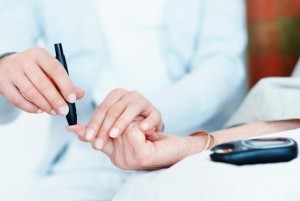- Home
- Editorial
- News
- Practice Guidelines
- Anesthesiology Guidelines
- Cancer Guidelines
- Cardiac Sciences Guidelines
- Critical Care Guidelines
- Dentistry Guidelines
- Dermatology Guidelines
- Diabetes and Endo Guidelines
- Diagnostics Guidelines
- ENT Guidelines
- Featured Practice Guidelines
- Gastroenterology Guidelines
- Geriatrics Guidelines
- Medicine Guidelines
- Nephrology Guidelines
- Neurosciences Guidelines
- Obs and Gynae Guidelines
- Ophthalmology Guidelines
- Orthopaedics Guidelines
- Paediatrics Guidelines
- Psychiatry Guidelines
- Pulmonology Guidelines
- Radiology Guidelines
- Surgery Guidelines
- Urology Guidelines
Hemoglobin A1c test unreliable for diabetes diagnosis: Endocrine Society meeting

USA: Hemoglobin A1c also called A1c or glycated hemoglobin is a blood test used widely for the diagnosis of diabetes. However, a recent study presented at The Endocrine Society's annual meeting in New Orleans has found that the test is highly unreliable and has a tendency to underestimate the prevalence of the disease.
The test evaluates the average amount of glucose in the blood over the last 2 to 3 months by measuring the percentage of glycated hemoglobin in the blood. Diabetic people undergo this test to determine whether one at increased risk of developing diabetes, also helps to diagnose diabetes and prediabetes; and monitor diabetes. The HbA1c test requires no testing preparation.
A glucose tolerance test, also known as the oral glucose tolerance test, measures the body's response to sugar (glucose). In this test, a person’s blood is taken after an overnight fast, and then again two hours after they drink a sugary drink. The glucose tolerance test can be used to screen for type 2 diabetes.
“Based on our findings, A1c should not be solely used to determine the prevalence of diabetes,” lead researcher Maria Mercedes Chang Villacreses, City of Hope’s Diabetes and Metabolism Research Institute in Duarte, California, said in a press release. “It should be used in conjunction with the oral glucose test for increased accuracy.”
The research team analyzed data from 9,000 adults from the 2005-2014 National Health and Nutrition Examination Survey who did not have a diagnosis of diabetes.
Also Read: Fluctuating HbA1c levels strong predictor of mortality in diabetes
The authors found that:
- When compared to the oral glucose tolerance test (OGTT), HbA1c will over-diagnose glucose tolerance by 42% and under-diagnose diabetes in 73% of adults. These individuals would miss the opportunity for early intervention.
- For diagnosing diabetes, hemoglobin A1c had a sensitivity of 26.93% and specificity of 99.39%. For determining NGT, the test had a sensitivity of 84.91% and a specificity of 43.53%.
- The accuracy of hemoglobin A1c varied across by races and ethnicity. It had the highest sensitivity for diagnosing diabetes in non-Hispanic blacks (41.25%), followed by Mexican Americans (30.71%) and non-Hispanic whites (21.11%).
- The sensitivity of the test for diagnosing NGT was lowest in non-Hispanic blacks (71.79%), followed by Mexican Americans (86.69%) and non-Hispanic whites (89.40%).
Also Read: ACP’s New HbA1c Targets for Glycemic Control in T2DM
“Our results indicated that the prevalence of diabetes and normal glucose tolerance defined solely by A1c is highly unreliable, with a significant tendency for underestimation of the prevalence of diabetes and overestimation of normal glucose tolerance,” Chang Villacreses said.

Disclaimer: This site is primarily intended for healthcare professionals. Any content/information on this website does not replace the advice of medical and/or health professionals and should not be construed as medical/diagnostic advice/endorsement or prescription. Use of this site is subject to our terms of use, privacy policy, advertisement policy. © 2020 Minerva Medical Treatment Pvt Ltd